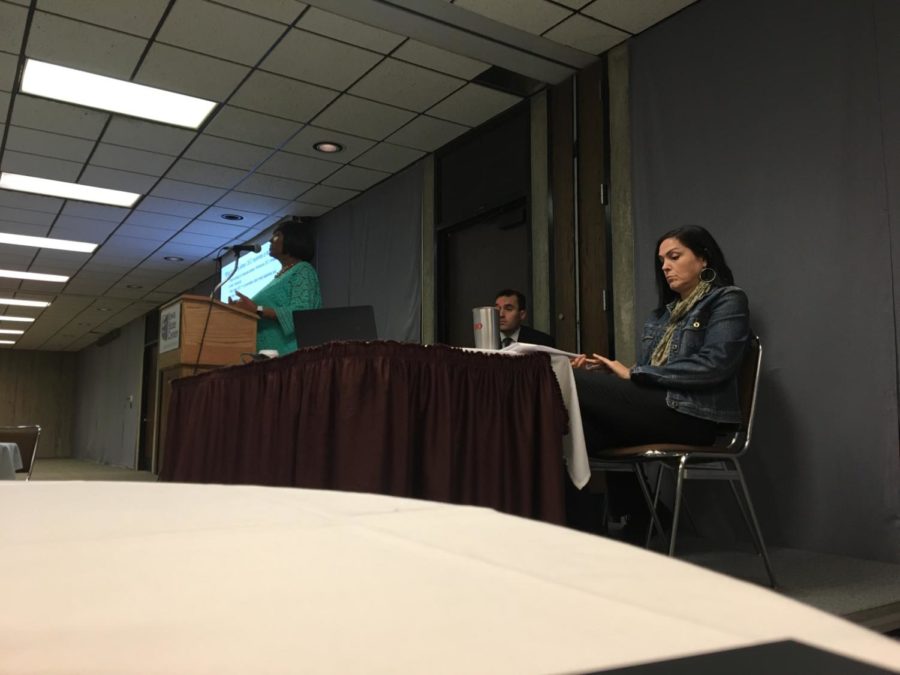Sexual misconduct focus point of faculty and staff summit
Madison Mason/Iowa State Daily
Margo Foreman, the assistant vice president for diversity, inclusion and equal opportunity and Title IX coordinator, spoke at the Sexual Misconduct Summit on Sept. 27, 2019.
September 27, 2019
Iowa State acknowledged an important topic that is a problem globally at college campuses, sexual violence, and held its second Sexual Misconduct Summit at the Scheman building on Friday.
To start the summit, there was a continental breakfast which was followed by a brief welcome by Vernon Hurte, associate vice president and dean of students as well as a chair of the Sexual Misconduct Leadership Committee.
Following Hurte’s welcome, attendees got to hear from a panel about the policies and actions that the university and the campus police can take in the case of sexual violence presented by Aaron Delashmutt, director of public safety; Margo Foreman, the assistant vice president for diversity, inclusion and equal opportunity and Title IX coordinator; Sara Kellogg, assistant dean of students for the Dean of Students Office; and Sean Nelson, extension equal opportunity specialist for the Equal Opportunity Office.
“[Sexual misconduct] is a very important topic, a major priority for us as an institution as we continue our commitment that Iowa State University grows as a safe and welcoming campus for all,” Hurte said.
Delashmutt started off the panel by talking about the legal process that one can take in the instance of sexual violence.
Delashmutt told attendees the process of meeting with someone who had gone through a traumatic event such as sexual violence, as well as the options victims can take. Victims can not do anything, they can file a report, or they can go through with a criminal case. Through interviews, evidence and increased investigation, the Iowa State Police Department can provide multiple options for victims of sexual crimes.
“We’ll just walk through their options and if it looks like they kind of want to move forward we’ll start talking about what that means,” Delashmutt said.
Nelson then spoke on how the Office of Equal Opportunity deals with incidents of sexual violence.
Nelson explained how, if their office is informed of an act that falls under Title XI policy, they reach out to both parties and meet with them about the incident. Then Nelson explained how the impacted parties can proceed under the university, whether it’s reaching out to the other person, or going on with an investigation: informal or formal.
“There’s informal, which is not going to be drawn out of a formal process for that, where all parties agree to a resolution,” Nelson said.
Foreman went on to explain the formal process that happens through the university.
“First I want to make you understand that we do this work every day,” Foreman said. “We kind of have to form a relationship with the work that we can’t be excitable all the time. So I want to make sure that you don’t take out casualness around this situation, as one that we don’t take it seriously, because we do.”
Foreman addressed a flow chart handout she provided when referencing the steps taken in a formal process to address an act of sexual violence. Within the chart, Foreman explained how a complaint can be filed.
An investigator speaks with both the complainant and respondent, an investigation fully takes place, a final report is shared with both parties and the parties have an opportunity to reach a solution. If no solution is reached then the case goes to the hearing board. After given the information the hearing board listens to statements from both parties, then the board deliberates and finally, they reach a verdict and respond to both parties.
Kellog spoke on how the safety of students and property on campus is taken seriously and can be protected in the instance of a complaint being filed. Kellog also went over again the different options and resources a student can take such as informal or formal cases, as well as counseling if needed, as well as implementing and making sure that all parties understand the guidelines under the Title XI policy and the punishments that can follow.
“That’s something we do with consultation with the partners that we have,” Kellog said. “It’s not something that happens every time something happens in the hall or something happens in the dining facility. We have to make an evaluation of the information that we have, whether or not we’re able to substantiate some of that information, and before we remove any student privileges, we just want to make sure that those things exist.”
After the panel concluded, the group of faculty, staff and community partners in attendance disbanded into breakout sessions which covered some of these topics more in-depth, such as providing support, addressing sexual misconduct and case studies, among other topics.







